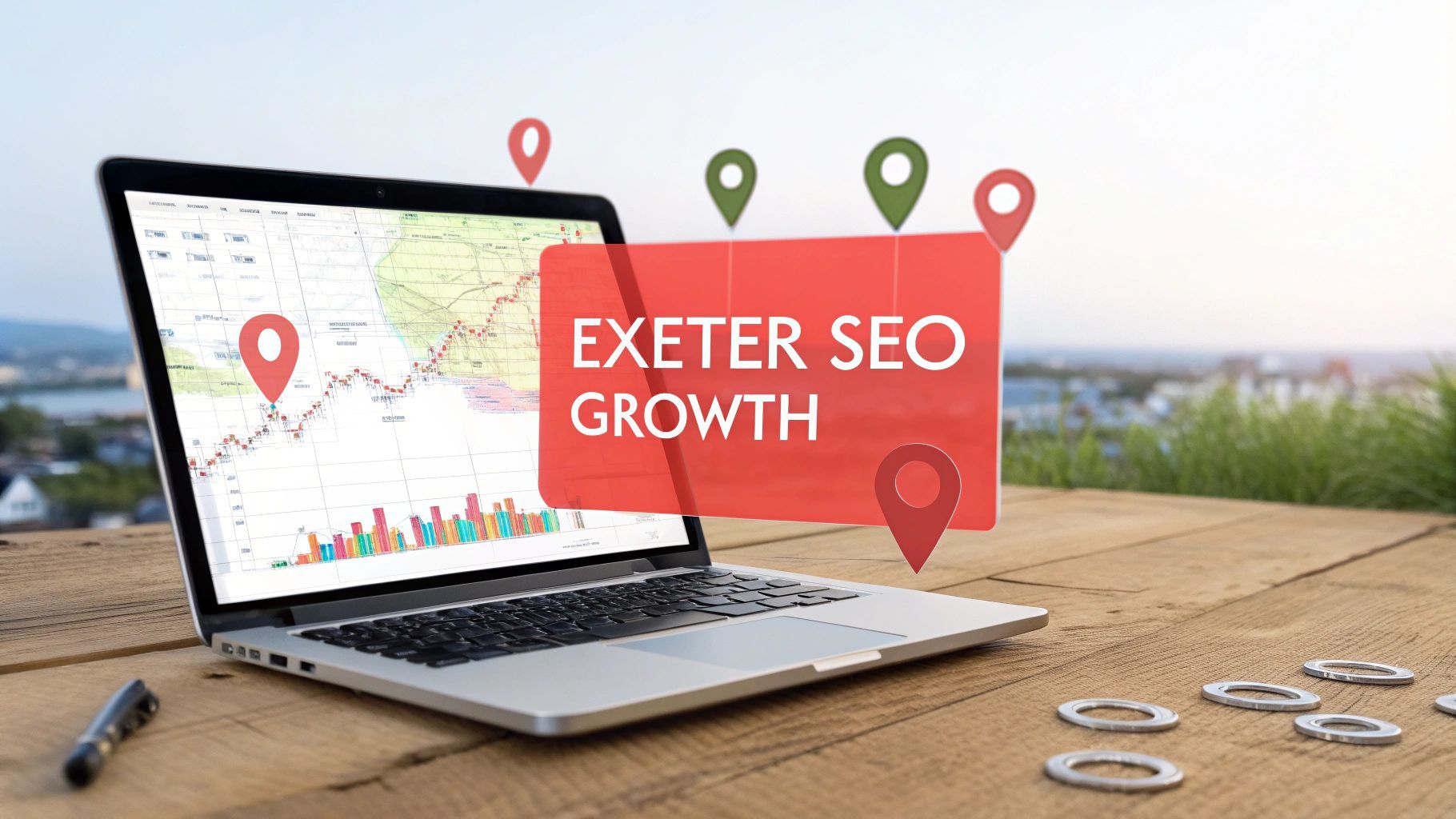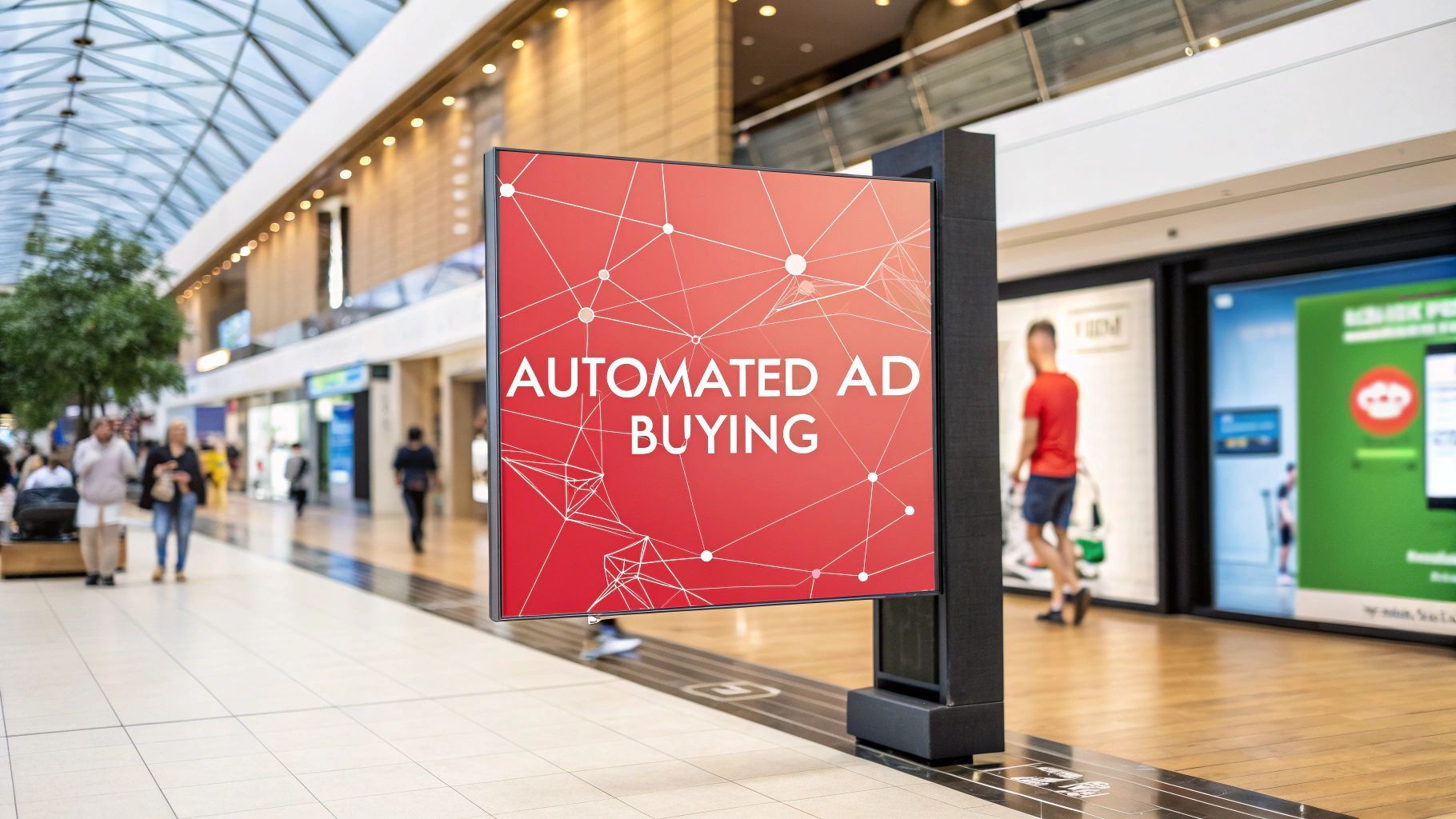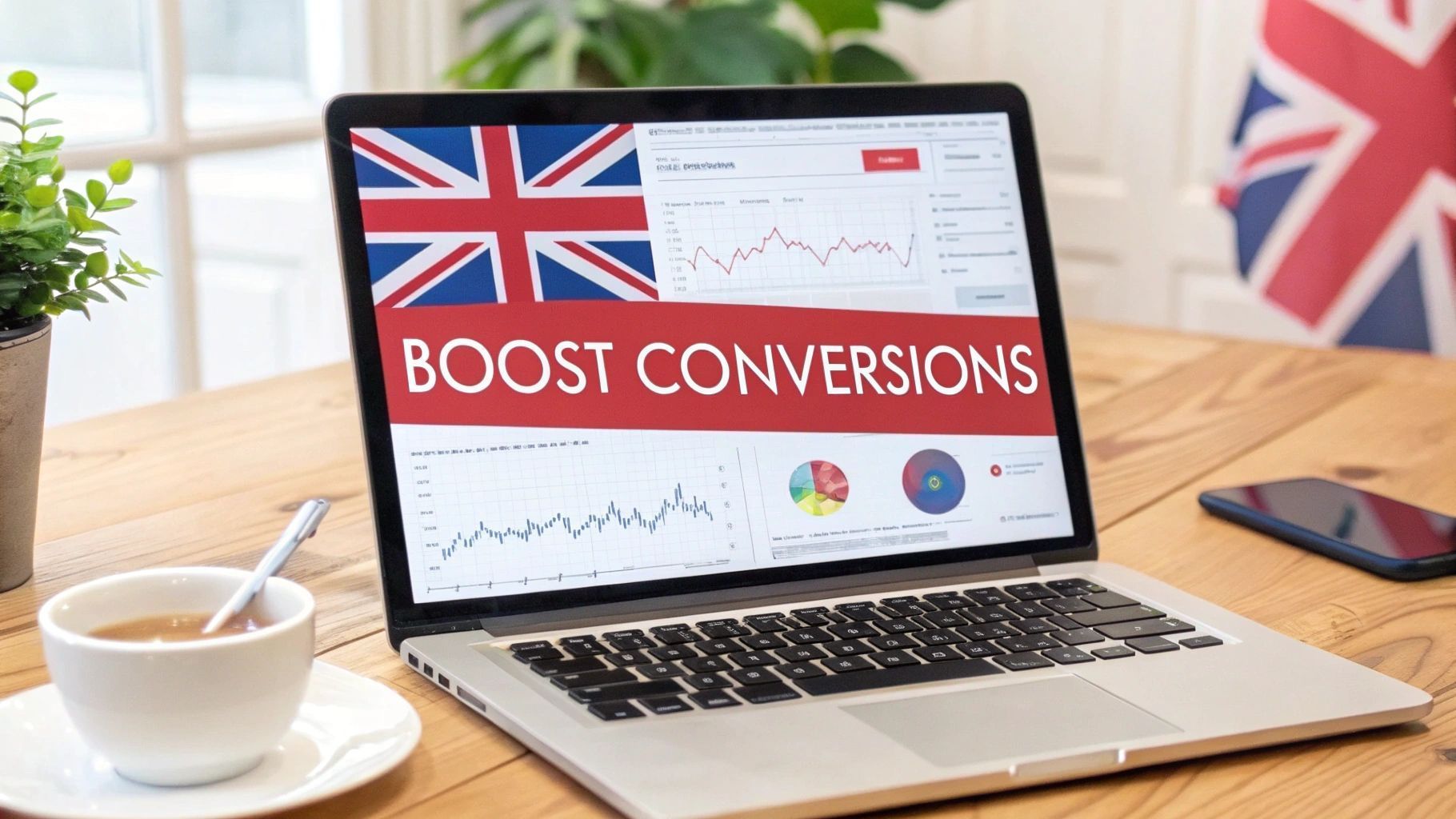Choosing a Programmatic Advertising Agency
In simple terms, a programmatic advertising agency is your specialist partner for buying digital ad space. They use powerful technology to place your adverts in front of the right people, at the right time, for the best possible price.
Think of them as expert fund managers for your advertising budget, blending sophisticated software with smart human strategy to get you the highest possible return.
What Does a Programmatic Advertising Agency Actually Do?
Imagine a massive, high-speed stock exchange. But instead of trading stocks and shares, it's trading billions of digital advertising opportunities every single second. This is the world of programmatic advertising.
A programmatic advertising agency acts as your expert guide and broker in this incredibly complex market, navigating it with precision to help your business grow.
Their main job is to solve a huge problem for UK businesses: the sheer complexity of modern digital advertising. Trying to manually buy ad space across thousands of different websites, apps, and platforms is no longer just inefficient—it's impossible. An agency swaps out all that guesswork for data led automation.
Bridging Technology and Strategy
The agency’s role isn’t just about having the flashiest tech; it’s about making that tech deliver on your specific business goals. They bring together powerful software with deep strategic knowhow to make sure every penny of your budget is spent wisely.
Here’s how they deliver real value:
- Precision Targeting: They use data to find and reach your ideal customers based on their interests, online behaviour, and demographics. This drastically cuts down on wasted ad spend.
- Real-Time Bidding: In the milliseconds it takes for a webpage to load, their systems analyse the user. If that person is a good match for your campaign, the system places a bid on the ad space—all in the blink of an eye. This means you only pay for impressions that actually matter.
- Performance Optimisation: A good agency never just "sets and forgets". They constantly monitor campaign data, tweak bids, refine audiences, and test different ad creatives to keep improving your results and maximising your return on investment.
This combination of services makes them far more than just a media buyer. To get a better sense of where they fit in the broader marketing world, you can learn more about what a media marketing agency does and see how their specialisms compare.
At its heart, a programmatic agency transforms your advertising from a scattergun approach into a surgical operation. They find the exact moments and places where your message will have the most impact, turning potential customers into loyal advocates.
The Human Element in an Automated World
While automation is the engine, human expertise is the person in the driver's seat. The agency's team provides the critical thinking and strategic oversight that machines just can't replicate.
It's the people who set the overall campaign direction, make sense of complex performance data, and make the high level decisions that algorithms aren’t built for.
This human touch is crucial for things like brand safety —making sure your ads don’t show up next to inappropriate content—and for creative strategy, ensuring the message itself actually connects with your audience.
Ultimately, a programmatic advertising agency gives you the technology, the talent, and the strategic focus you need to compete in a crowded digital world, delivering results that are often impossible to achieve on your own.
How Programmatic Advertising Works
Imagine an auction house, but instead of art and antiques, it’s selling ad space on websites. Now, speed that auction up so it happens in the time it takes for a webpage to load. That’s programmatic advertising. It’s a completely automated, high speed marketplace, and a programmatic agency is your expert trader navigating it all.
When you land on a website, a little packet of anonymised data about you – things like your location, the device you're on, and your general browsing habits – is sent to this digital marketplace. Advertisers, with their agency's help, have already decided exactly who they want to reach. If you match their ideal customer profile, their systems automatically place a bid to show you their ad.
The whole thing is called real-time bidding (RTB) , and it happens in the blink of an eye. The highest bidder wins, and their advert appears on your screen. It’s a genius system that ensures advertisers pay the right price for the right audience, while website owners (the publishers) get the most value for their ad space.
The Key Players in the Programmatic Ecosystem
This digital auction isn’t just one piece of software; it’s an ecosystem of interconnected platforms working together seamlessly. A good programmatic agency knows exactly how to get these moving parts to work in perfect harmony to drive results for your campaigns.
-
Demand-Side Platform (DSP): This is the advertiser's command centre. Your agency uses a DSP to buy ad space across countless websites, manage the bidding strategy, and set all the targeting parameters. Think of it as their trading desk where they input your campaign goals, budget, and audience details.
-
Supply-Side Platform (SSP): This is the publisher's tool. It allows website and app owners to automatically sell their ad space to the highest bidder, making their inventory available to thousands of potential advertisers at once.
-
Ad Exchange: This is the central marketplace connecting the DSPs and SSPs. It’s the digital auction floor where the real time bidding actually happens, facilitating the transaction between the buyer and the seller.
The fluid interaction between these platforms is what makes programmatic so powerful. It replaces the old, slow, manual process of negotiating ad placements with intelligent, data led automation.
Programmatic advertising isn't just about automation. It's about using data and technology to make smarter, faster, and more effective advertising decisions at a massive scale, ensuring your message connects with the right person at the perfect moment.
This simple infographic breaks down the core process that a programmatic agency manages, from initial budget to measurable results.
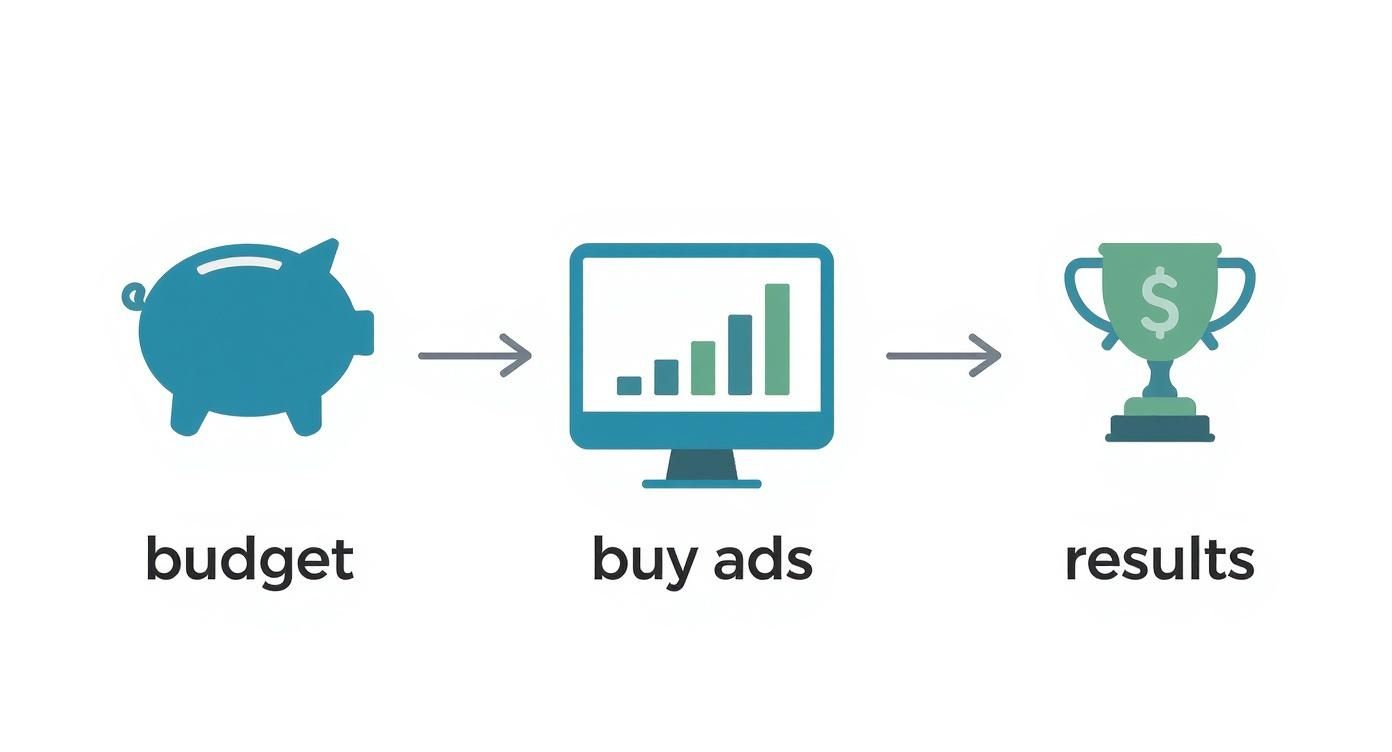
It shows how an agency takes a client's budget, turns it into a highly targeted ad buying strategy, and then measures the outcomes to deliver a real return.
The Growth of Programmatic in the UK
It’s no surprise that this model’s efficiency and sharp targeting have led to its rapid adoption here in the UK. The programmatic market is seeing huge growth as more and more businesses rethink where their digital marketing spend is going.
In 2024, the market was valued at around $12.33 billion . By 2025, it's projected to hit $15.68 billion – that’s a compound annual growth rate of roughly 27% . This boom is being driven by the relentless pursuit of efficiency, better audience targeting, and the explosion of video and mobile advertising. As UK businesses demand better returns on their ad spend, programmatic is quickly becoming the new standard.
You can dive deeper into the UK programmatic market on researchandmarkets.com.
What A Programmatic Agency Actually Does
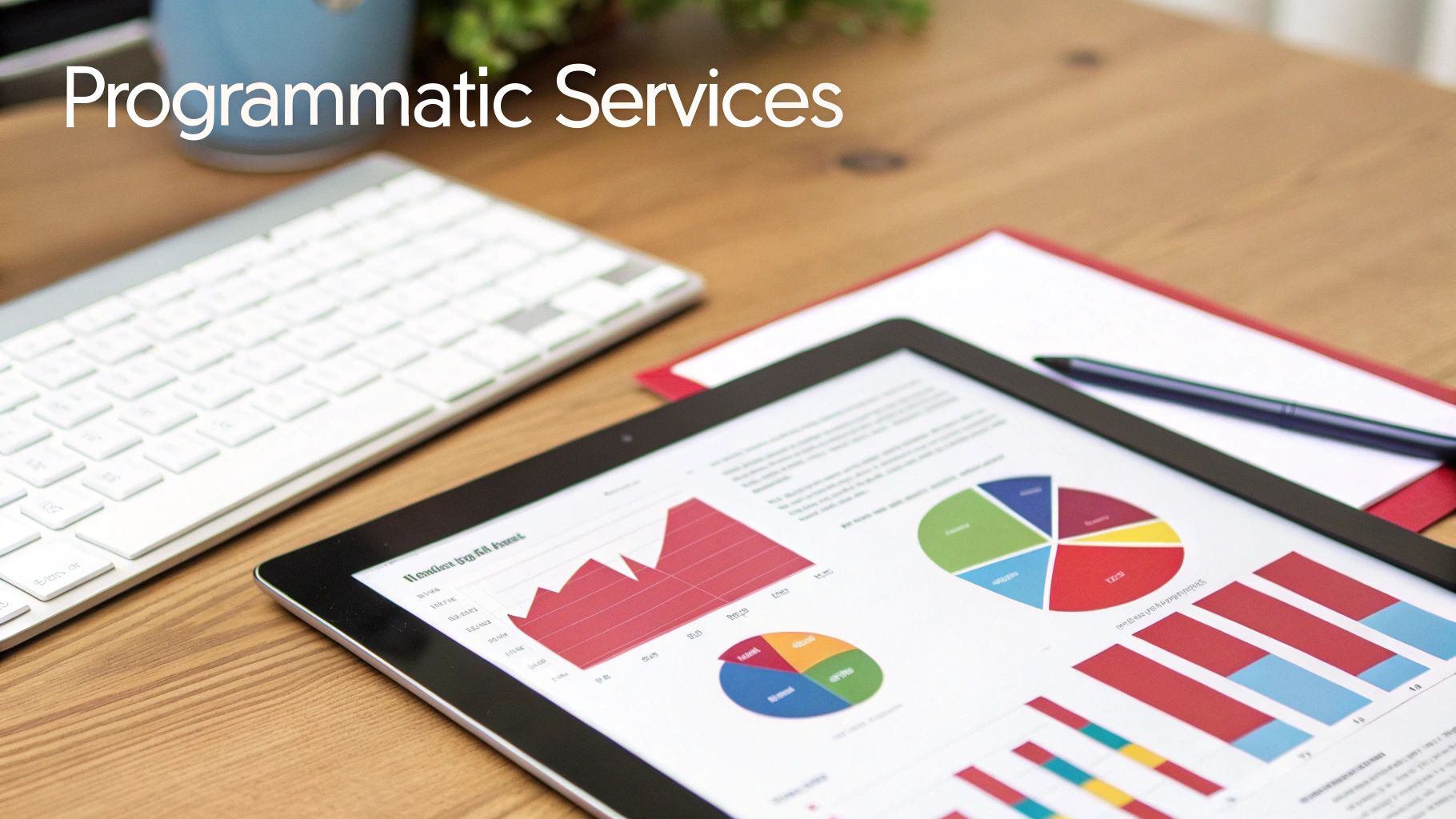
A top tier programmatic agency offers a lot more than just hitting a button to buy ad space. Think of them as your strategic partner, whose entire focus is making every single pound of your ad budget work harder and smarter. Their real value comes from a whole suite of services that connect technology, data, and creative thinking into a single, powerful strategy.
It all starts with strategic campaign planning . This isn't just about setting a budget and hoping for the best. A good agency sits down with you to get under the skin of your business goals, nail down your key performance indicators (KPIs), and paint a crystal clear picture of your ideal customer.
This groundwork ensures every decision made from that point on directly supports your bigger commercial objectives, whether that’s getting your brand seen, pulling more visitors to your website, or driving up sales.
Getting Granular With Audience Targeting
One of the most potent tools in their arsenal is advanced audience segmentation . A specialist agency can create incredibly detailed profiles of the people you want to reach by weaving together different strands of data.
They’ll take your own first party data (think customer purchase histories or CRM info) and layer it with valuable third party data from external providers, which gives anonymised insight into browsing habits and interests. This allows them to zero in on very specific, niche audiences with uncanny accuracy.
Imagine an online furniture shop. They could target ads for new sofas specifically to people who've recently looked for mortgages, read interior design blogs, and happen to live in a particular postcode. That's the level of precision we're talking about.
Buying Media and Refining Creative Across All Channels
Today’s customers are everywhere—on their phones, laptops, and smart TVs. A savvy agency gets this. They specialise in cross channel media buying , building a seamless advertising presence across all the digital spaces your audience occupies.
And it’s not just about standard website banner ads anymore. Their reach typically includes:
- Video: Placing ads on platforms like YouTube before or during content.
- Mobile: Targeting users directly within apps and on mobile first websites.
- Connected TV (CTV): Reaching households through their smart TVs and streaming services.
- Digital Out of Home (DOOH): Running ads on digital billboards in real time.
The UK’s mobile programmatic market is a giant in its own right. Valued at $18.8 billion back in early 2021, it’s on track to hit $29.3 billion by 2025 as our reliance on smartphones grows. With mobiles set to account for around 58.34% of the UK's digital ad revenue in 2024, an agency's ability to run sharp mobile campaigns is absolutely critical.
Alongside smart placement, there's creative optimisation . The agency will constantly test different ad visuals, headlines, and calls to action (CTAs). They figure out what works and what doesn't, keeping your message sharp and effective. This data first approach takes all the guesswork out of the creative side of things. It's not uncommon for their work to tie into broader strategies, using tools for marketing automation for agencies to build a truly joined up customer journey.
A great programmatic agency plays two roles: they're the architect and the scientist. They design the campaign's blueprint, then rigorously test and tweak every single variable until it becomes a well-oiled, high-performance machine.
Programmatic Agency Services vs In-House Management
Deciding between a specialist agency and keeping things in house can be tough. The right choice often comes down to the depth of expertise and resources you need to truly make programmatic work for you. Here’s a quick comparison to see where the key differences lie.
| Capability | Programmatic Advertising Agency | Typical In-House Team |
|---|---|---|
| Technology Access | Access to multiple premium DSPs and data platforms. | Often limited to one or two platforms. |
| Expertise | Dedicated team of specialists with cross industry experience. | Generalist marketers who may lack deep programmatic knowledge. |
| Data Resources | Established relationships with third party data providers. | Primarily relies on first party data. |
| Strategic Insight | Broad market view and insights from hundreds of campaigns. | Perspective is limited to the company's own data. |
| Optimisation | Continuous, real time campaign optimisation and A/B testing. | Optimisation may be less frequent due to other responsibilities. |
| Cost Efficiency | Agency fees, but often delivers higher ROAS through expertise. | No direct fees, but potential for budget wastage and missed opportunities. |
Ultimately, while an in house team offers control, a specialised agency brings a level of experience, tech access, and strategic insight that is incredibly difficult to replicate on your own.
Clear Reporting That Actually Means Something
Finally, performance analysis and reporting is a cornerstone of what they do. Any credible agency will give you clear, transparent reports that turn a mountain of data into genuinely useful business insights. We're not talking about vanity metrics like impressions.
They focus on the numbers that actually matter to your bottom line: return on ad spend (ROAS), cost per acquisition (CPA), and customer lifetime value (CLV). By tracking these, they show you exactly what you’re getting for your money and prove the real world impact of their efforts. These insights then feed back into the strategy, creating a loop of constant improvement. If you're keen to dig deeper into these kinds of roles, our guide on digital media marketing specialities is a great place to start.
The Real-World Benefits of Hiring a Specialist Agency
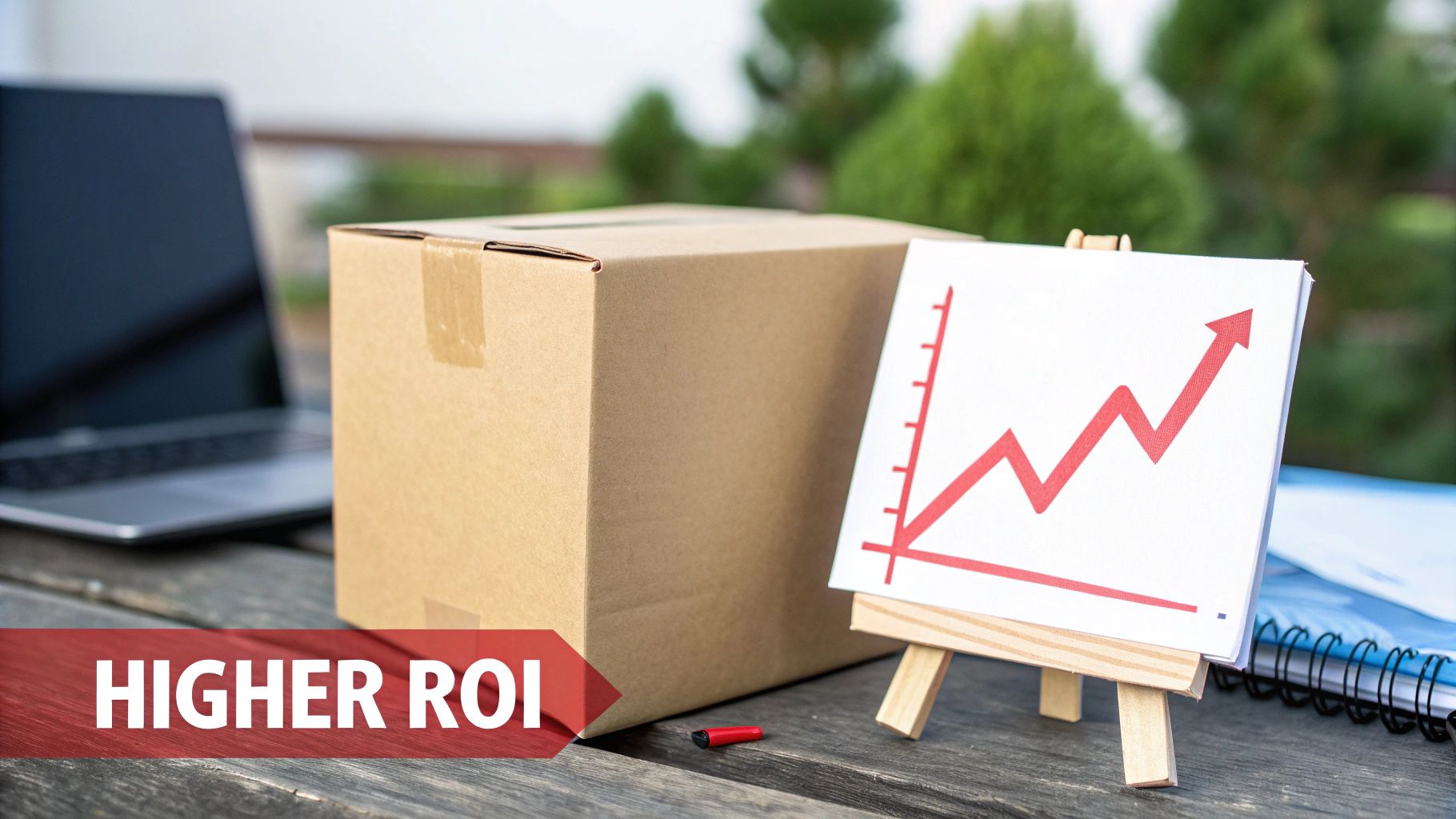
The first and most obvious win is a huge cut in wasted ad spend. Forget casting a wide net and hoping for the best. An agency uses laser focused targeting to make sure your budget is only spent reaching people who are actually interested in what you sell. That precision means every single pound is working harder for you.
Gaining a Competitive Edge with Advanced Tools and Access
One of the biggest perks of bringing in an agency is getting instant access to enterprise level technology without the crippling upfront costs. These powerful platforms, known as Demand-Side Platforms (DSPs), come with massive licensing fees and a steep learning curve.
An agency effectively puts this power in your hands, giving your business the same tech advantage as the big players. It completely levels the playing field, letting you compete for the same high value audiences.
What’s more, specialist agencies have built up relationships that unlock premium ad inventory . We’re talking about ad space on high quality, respected websites that you can’t just buy on the open market. Getting your brand seen in these trusted environments doesn’t just boost campaign performance—it enhances your own credibility by association.
By integrating with a wider strategy, a specialist programmatic agency helps clients leverage the full scope of unmissable benefits of digital marketing , delivering superior ROI and targeted reach.
The Irreplaceable Value of Human Oversight
Programmatic advertising might be built on automation, but its success still depends on an expert human eye. An agency provides that critical layer of strategy and protection that an algorithm just can't replicate. Their team is constantly monitoring campaigns to shield your brand from two major threats: ad fraud and dodgy placements.
Ad fraud is a real budget killer, with bots generating fake clicks and impressions that give you absolutely nothing in return. A good agency uses sophisticated tools and constant vigilance to spot and block this nonsense before it costs you.
Just as important is brand safety. The team makes sure your ads don't pop up next to inappropriate or controversial content that could seriously damage your reputation. This human diligence is absolutely vital for keeping your brand image squeaky clean.
A Real-World Success Story
Take a UK based online retailer that specialises in bespoke leather goods. Their early ad efforts were all over the place, resulting in a miserable return on ad spend (ROAS). Fed up with throwing money away, they brought in a programmatic agency.
The agency got to work immediately, building a strategy based on data. They dug into the retailer's existing customer information to create detailed audience profiles, spotting niche groups like classic car enthusiasts and fans of specific luxury watch brands.
Armed with these insights, they launched hyper targeted campaigns across premium lifestyle websites and mobile apps. The change was immediate and dramatic. The retailer saw a 300% increase in ROAS in the first three months. By simply reaching the right people with the right message, the agency turned a failing ad budget into a serious moneymaker.
How to Choose the Right Programmatic Advertising Agency
Picking the right programmatic advertising agency is one of the most important calls you'll make for your marketing strategy. This isn't just about hiring a supplier; it's about finding a strategic partner who can turn your advertising budget into a genuine engine for business growth.
The right agency becomes an extension of your own team. They bring the expertise, technology, and insights needed to navigate the complex world of automated ad buying. The wrong one? That path leads to wasted spend, poor results, and a whole lot of frustration.
Assess Their Transparency and Fee Structure
First things first: transparency. A trustworthy agency will be an open book about their fees, performance data, and the tech they use. You absolutely need to know where every penny of your money is going.
Ask them for a complete breakdown of their fee structure. It should clearly separate their management fee from the actual media spend and any extra costs for data or specific tech platforms. If an agency gets vague or cagey about its pricing, that’s a massive red flag.
Evaluate Their Technological Capabilities
A programmatic agency is only as good as the tools in its toolbox. You need a partner with access to a wide range of Demand-Side Platforms (DSPs). This is crucial because different DSPs have unique strengths and tap into different ad inventories.
An agency that only uses one or two platforms is instantly limited in its ability to reach your ideal audience or lock down the best ad placements. Ask them which DSPs they work with and, more importantly, why. Their answer will tell you a lot about their technical depth and strategic flexibility.
The UK market is a global powerhouse in programmatic, and that’s not changing anytime soon. In 2025, the UK is expected to spend around $23.19 billion on programmatic advertising. To put that in perspective, it’s nearly double the combined spend of France and Germany ( $12.65 billion ). This dominance shows just how vital it is to partner with an agency that gets how to run campaigns across mobile and newer channels like Connected TV (CTV). You can read more on the UK's programmatic ad spend on emarketer.com.
Choosing an agency is like choosing a pilot for your brand. You’re not just paying for their time; you’re paying for their judgement, their experience with the controls, and their ability to navigate turbulence to get you to your destination safely and efficiently.
Scrutinise Case Studies and Industry Experience
Theory is one thing, but proven results are what really matter. Always ask to see case studies from clients in your industry or with similar business goals. It's the best way to see what they can actually do in the real world.
Look for solid evidence that they’ve successfully tackled challenges just like yours. A portfolio packed with glowing results for e-commerce brands is great, but it might not mean much if you’re a B2B software company. Relevant experience is a powerful sign that they’ll understand the quirks of your market from day one.
Check Their Expertise in Data Privacy
In the UK, data privacy isn't just a good idea; it's a legal minefield. Any decent agency must have a deep understanding of regulations like GDPR. This is non-negotiable for running compliant campaigns and protecting your business from some very hefty fines.
Question them on how they handle user consent and first party data. Their approach to privacy reflects their professionalism and their commitment to ethical advertising. This is one area where you simply can’t afford to take any risks. For some more general advice, our guide on how to choose a digital marketing agency offers other valuable tips.
Agency Evaluation Checklist
To help you cut through the noise, use this checklist of critical questions when you're talking to potential partners. Their answers will give you a much clearer picture of whether they're the right fit.
| Area of Evaluation | Key Question to Ask |
|---|---|
| Transparency | Can you provide a detailed breakdown of all fees, including media spend, data costs, and your management fee? |
| Technology | Which DSPs do you have access to, and how do you decide which one to use for a specific campaign? |
| Experience | Can you share case studies from clients in our industry that demonstrate a clear return on ad spend? |
| Strategy | What is your process for developing a campaign strategy, from initial brief to ongoing optimisation? |
| Data Privacy | How do you ensure our campaigns remain fully compliant with GDPR and other UK data protection laws? |
| Reporting | What metrics do you focus on, and how often will we receive performance reports? |
Choosing the right programmatic advertising agency takes diligence. By focusing on transparency, technical access, relevant experience, and strategic thinking, you can find a partner that won’t just manage your campaigns, but will help drive your business forward.
Your Top Questions Answered
Deciding to bring a programmatic agency on board is a big move, and it's totally normal to have questions about how it all works in practice. We get it.
This section tackles the most common queries we hear from UK businesses, with straight talking answers to help you feel confident about your next steps. We'll get into costs, what to expect from contracts, and what those first few months of working together actually look like.
How Much Does a Programmatic Advertising Agency Cost in the UK?
There’s no single price tag, but most specialist agencies charge a management fee based on a percentage of your monthly ad spend. You can typically expect this to be somewhere between 10% and 20% . It’s a popular model because it scales directly with your investment.
Some agencies might offer a fixed monthly retainer instead, which gives you predictable costs. Others use a hybrid model, mixing a retainer with a performance bonus. The most important thing is to demand total transparency. The agency’s fee should be clearly separated from other costs like access to tech platforms or any third party data charges.
Also, be aware that many agencies have a minimum monthly ad budget to make the partnership work. This usually starts around £3,000 to £5,000 , so it’s one of the first things you should ask to make sure they’re the right fit for your budget.
What Is the Difference Between a Programmatic and a General Digital Agency?
This is a really important distinction to make. A general digital agency is a jack of all trades, offering a broad mix of services like SEO, social media, and content. Programmatic is just one of the things they do.
A specialist programmatic agency, on the other hand, lives and breathes this stuff. Day in, day out. Their team has a much deeper level of technical skill, stronger relationships with the technology vendors (like DSPs), and a far more sophisticated grasp of bidding strategy and data analysis.
A generalist agency offers convenience, but a specialist provides mastery. If you expect programmatic to be a serious growth engine for your business, the focused expertise of a specialist nearly always delivers a much stronger return.
Is Programmatic Advertising Suitable for Small Businesses?
Yes, one hundred percent. In fact, it can be a massive advantage. Programmatic gives smaller businesses the power to compete with the big players by zeroing in on highly specific audiences, which cuts down on wasted ad spend.
You don't need a colossal budget to make an impact. Instead, you can put your money precisely where it counts – in front of the people most likely to become your customers. An agency makes this level of sophistication accessible, managing the complex tech and providing the strategic thinking that would be almost impossible to replicate in house.
It’s a way for smaller companies to punch above their weight, using top tier tools and tactics without the huge cost and headache of building a specialist team from scratch.
How Quickly Can We Expect to See Results?
This is where a little patience pays off. While you’ll see initial data like impressions and clicks rolling in within a few days, a truly great campaign needs time to learn and get smarter.
This initial learning phase usually takes about two to four weeks. During this time, the algorithms are gathering vital performance data, testing different creative, and figuring out what connects with your audience. Think of it as a calibration period.
You can expect to see more meaningful, stable results – like a consistent return on ad spend (ROAS) or a predictable cost per acquisition (CPA) – after the first one to two months. By then, the campaign has enough data to shift from learning to continuous, intelligent optimisation, which is where the real growth happens.
Ready to see how a specialist programmatic advertising agency can transform your marketing results? The expert team at Superhub combines cutting edge technology with strategic insight to deliver campaigns that drive real business growth. Find out more at https://www.superhub.biz.
Want This Done For You?
SuperHub helps UK brands with video, content, SEO and social media that actually drives revenue. No vanity metrics. No bullshit.

